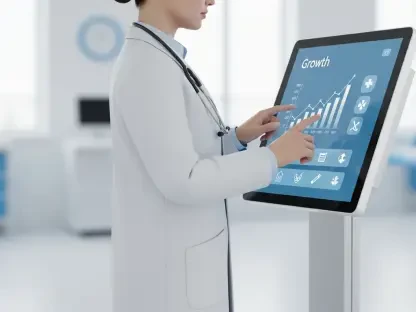The healthcare industry stands at a critical juncture where the demand for precision, efficiency, and accessibility has never been higher, with over 60% of global healthcare leaders reporting challenges in meeting patient expectations due to operational bottlenecks. This pressing reality underscores the urgent need for transformative solutions, and artificial intelligence (AI) emerges as a powerful contender to address these systemic issues. This review delves into the capabilities of AI in revolutionizing healthcare operations, exploring its key applications, performance metrics, and the broader implications for medical service delivery.
Core Features and Applications of AI in Healthcare
Enhancing Diagnostic Precision
AI’s ability to analyze vast datasets with machine learning algorithms marks a significant leap in diagnostic accuracy. By identifying subtle patterns in medical imaging and patient records, the technology detects conditions such as cancer and cardiovascular diseases at earlier stages than traditional methods. This capability not only improves patient prognosis but also reduces the burden on healthcare systems by minimizing advanced-stage treatments.
Beyond early detection, AI systems integrate diverse data sources, including genetic profiles and lifestyle factors, to refine diagnostic outcomes. Such comprehensive analysis ensures that subtle indicators of disease are not overlooked, offering a level of precision that complements human expertise. The result is a marked improvement in confidence among clinicians when making critical health decisions.
Optimizing Administrative Workflows
Administrative tasks, often a bottleneck in healthcare facilities, benefit immensely from AI-driven automation. Processes like appointment scheduling, billing, and electronic health record management are streamlined, allowing staff to redirect their focus toward patient care. This shift significantly cuts down wait times and enhances the overall patient experience in busy medical environments.
Moreover, predictive analytics powered by AI helps forecast patient admission rates and optimize staff scheduling. By aligning resources with anticipated demand, healthcare facilities can avoid overstaffing or understaffing scenarios. This operational efficiency translates into cost savings and a more responsive system capable of handling fluctuating patient volumes with ease.
Empowering Clinical Decision Support
AI’s role in clinical decision-making stands out as a game-changer, providing evidence-based recommendations by processing extensive medical literature and patient data at remarkable speeds. This functionality reduces the likelihood of human error, ensuring that treatment plans are grounded in the latest research and tailored to specific patient needs. Clinicians gain access to insights that enhance the quality of care delivered.
Additionally, the technology supports real-time decision-making during critical situations, such as surgeries or emergency interventions. By offering instant data analysis, AI equips healthcare providers with actionable information, fostering quicker responses to evolving patient conditions. This rapid support mechanism is proving indispensable in high-stakes medical settings.
Emerging Innovations and Industry Trends
The landscape of AI in healthcare continues to evolve with cutting-edge innovations like predictive analytics for personalized medicine. These tools analyze individual health profiles to craft treatment plans that minimize trial-and-error, ensuring therapies are both effective and efficient. Such advancements signal a broader shift toward patient-centered care models that prioritize unique health needs.
Another notable trend involves the integration of wearable devices for remote monitoring, enabling continuous health tracking outside traditional clinical settings. This development expands access to care, particularly for patients in remote or underserved areas, by facilitating real-time data sharing with providers. The industry’s move toward data-driven solutions is reshaping how healthcare is delivered and experienced.
A growing emphasis on telemedicine further illustrates AI’s transformative potential, with platforms leveraging the technology for virtual consultations and patient engagement. Interactive systems provide medication reminders and health advice, empowering individuals to take an active role in managing their well-being. This trend reflects a fundamental change in how healthcare systems connect with their communities.
Real-World Performance and Case Studies
In practical settings, AI’s impact on telemedicine has been profound, enabling remote patient monitoring through wearable tech and real-time data analysis. This allows providers to assess and manage patient health regardless of geographic barriers, a critical advantage for rural populations. The seamless flow of information ensures timely interventions without the need for frequent in-person visits.
Precision medicine offers another compelling example, where AI tailors treatment plans based on genetic and environmental factors. Hospitals implementing these solutions report faster recovery times and reduced side effects, highlighting the technology’s ability to optimize therapeutic outcomes. Such personalized approaches are gaining traction as a cornerstone of modern medical practice.
Patient engagement platforms powered by AI also demonstrate tangible benefits, offering tools that respond to inquiries and provide health education. These systems foster proactive health management, with studies showing improved adherence to treatment regimens among users. The success of these implementations underscores AI’s versatility across diverse healthcare domains.
Challenges in Implementation and Adoption
Despite its promise, AI in healthcare faces significant technical hurdles, particularly in data integration across disparate systems. Ensuring compatibility and accuracy when consolidating information from various sources remains a complex task, often delaying deployment. Addressing these issues requires robust infrastructure investments and standardized protocols.
Regulatory and ethical concerns also pose substantial barriers, with patient privacy at the forefront of debates. Striking a balance between leveraging data for innovation and safeguarding confidentiality is paramount, necessitating strict compliance with legal frameworks. Continuous monitoring is essential to prevent breaches that could undermine trust in AI solutions.
Bias in algorithms presents an additional challenge, as skewed data inputs can lead to inequitable treatment outcomes. Developers and providers must prioritize transparency and fairness, actively working to identify and mitigate biases. This commitment to ethical standards is crucial for ensuring that AI serves all populations equitably.
Future Outlook and Potential Developments
Looking ahead, AI’s trajectory in healthcare points to groundbreaking advancements in both patient care and operational efficiency. Over the next few years, from 2025 to 2027, anticipated innovations include more sophisticated predictive models that could preemptively address health risks before they escalate. Such progress promises to redefine preventive care on a global scale.
Collaboration among researchers, technology developers, and healthcare providers will be vital to overcoming existing limitations. Joint efforts can accelerate the creation of interoperable systems and ethical guidelines that support widespread adoption. This cooperative approach ensures that AI’s benefits are maximized while minimizing potential drawbacks.
The vision for AI in healthcare also includes a stronger focus on cost-effectiveness, with solutions designed to reduce expenses without compromising quality. As scalability improves, smaller clinics and underserved regions stand to gain access to cutting-edge tools, leveling the playing field. This democratization of technology could reshape the industry’s future landscape.
Final Thoughts and Next Steps
Reflecting on this comprehensive evaluation, AI proves to be a transformative force in healthcare operations, demonstrating remarkable strides in diagnostics, administrative efficiency, and personalized care. Its performance in real-world applications validates the technology’s capacity to address long-standing challenges, while emerging trends showcase an exciting path of innovation. The verdict is clear: AI stands as an indispensable asset for modernizing medical services.
Moving forward, stakeholders should prioritize investments in robust data integration frameworks to tackle technical barriers that hinder seamless implementation. Establishing clear ethical guidelines and fostering transparency in algorithm development emerge as critical steps to build public trust. These actions will pave the way for equitable access to AI-driven solutions.
Additionally, incentivizing cross-sector partnerships could unlock new avenues for innovation, ensuring that advancements reach diverse healthcare settings. By focusing on scalable and affordable technologies, the industry can bridge gaps in care delivery, particularly for underserved communities. This strategic direction promises to sustain AI’s momentum as a catalyst for lasting change in healthcare.









